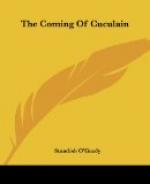“Why art thou so enraged?” said the King, “and why dost thou so maltreat my boys?”
It was a long time before the boy answered, so furiously burned the battle-fire within him, so that the King repeated his question more than once. At last he made answer—
“Because they have not treated me with the respect due a stranger.”
“Who art thou thyself?” said the King.
“I am Setanta, son of Sualtam and of Dectera thy own sister, and it is not before my uncle’s palace that I should be dishonoured.”
Concobar smiled, for he was well pleased with the appearance and behaviour of the boy, but Fergus caught him up in his great arms and kissed him, and he said—
“Dost thou know me, O Setanta?”
“I think thou art Fergus Mac Roy,” he answered.
“Wilt thou have me for thy tutor?” said Fergus.
“Right gladly,” answered Setanta. “For in that hope too I left Dun Dalgan, coming hither secretly without the knowledge of my parents.”
This was the first martial exploit of Setanta, who is also called Cuculain, and the reward of this his first battle was that the boys at his uncle’s school elected him to be for their captain, and one and all they put themselves under his protection. And a gentle captain made he when the war-spirit went out of him, and a good play-fellow and comrade was Setanta amongst his new friends.
That night Setanta and Laeg slept in the same bed of healing after the physicians had dressed their wounds; and they related many things to each other, and oft times they kissed one another with great affection, till sweet sleep made heavy their eyelids.
So, impelled by the unseen, Setanta came to Emain Macha without the knowledge of his parents, but in fulfilment of the law, for at a certain age all the boys of the Ultonians should come thither to associate there with their equals and superiors, and be instructed by appointed tutors in the heroic arts of war and the beautiful arts of peace. Concobar Mac Nessa was not only King of Ulster and captain of the Red Branch, but was also the head and chief of a great school. In this school the boys did not injure their eyesight and impair their health by poring over books; nor were compelled to learn what they could not understand; nor were instructed by persons whom they did not wish to resemble. They were taught to hurl spears at a mark; to train war-horses and guide war-chariots; to lay on with the sword and defend themselves with sword and shield; to cast the hand-stone of the warrior—a great art in those days; to run, to leap, and to swim; to rear tents of turf and branches swiftly, and to roof them with sedge and rushes; to speak appropriately with equals and superiors and inferiors, and to exhibit the beautiful practices of hospitality according to the rank of guests, whether kings, captains, warriors, bards or professional men, or unknown wayfarers; and to play at chess and draughts, which were the chief




